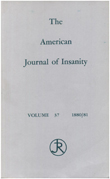Predictors of alprazolam discontinuation with and without cognitive behavior therapy in panic disorder
Abstract
OBJECTIVE: In a previous paper the authors reported survival data for 20 panic disorder patients whose therapeutic doses of alprazolam were tapered by one of two methods: slow, flexible drug taper with supportive medical management or the same taper procedure carried out concurrently with cognitive behavior therapy. This report is an analysis of predictors of drug discontinuation success in that study. In addition, between-group comparisons of clinical measures at follow- up are presented. METHOD: The subjects in the previous study (10 in each group) were assessed blindly at baseline, 2 weeks after completion of drug taper, and at 3- and 6-month follow-up. Potential predictors of drug discontinuation success were tested by using logistic regression. Between-group differences in symptom severity at 3-month follow-up were examined by using analyses of covariance. RESULTS: Thirteen subjects (nine receiving alprazolam plus cognitive behavior therapy and four receiving alprazolam only) completed the drug taper on schedule and were still medication free at follow-up. A single variable--baseline-to- posttaper change in anxiety sensitivity--predicted drug status at follow-up in 85% of the cases. At follow-up, subjects in the combined- treatment group were significantly more improved on measures of anxiety, depression, catastrophic thinking related to anxiety, perception of emotional control, and disability than subjects in the drug-only group. CONCLUSIONS: Across groups, reduction in the fear of anxiety symptoms was the best predictor of patients' ability to achieve and maintain drug abstinence. Some implications of that finding for the pharmacotherapy of panic disorder are discussed.
Access content
To read the fulltext, please use one of the options below to sign in or purchase access.- Personal login
- Institutional Login
- Sign in via OpenAthens
- Register for access
-
Please login/register if you wish to pair your device and check access availability.
Not a subscriber?
PsychiatryOnline subscription options offer access to the DSM-5 library, books, journals, CME, and patient resources. This all-in-one virtual library provides psychiatrists and mental health professionals with key resources for diagnosis, treatment, research, and professional development.
Need more help? PsychiatryOnline Customer Service may be reached by emailing [email protected] or by calling 800-368-5777 (in the U.S.) or 703-907-7322 (outside the U.S.).



